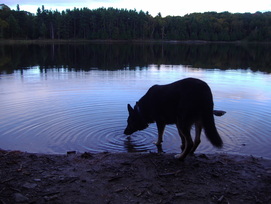
Thanks to Christine Miscione for asking me to take part in this Blog Tour. It was an interesting experience. I don't think I've ever really thought about why I write what I write. I'm glad I was able to figure it out.
What am I working on?
A new chapbook of recent poems: Check Engine. Rhinoceros. Tungsten. Unlike my previous chapbook, The Robot Dreams, which was entirely prose poems, this chapbook will be a foray of forms, from minimalist poems to sonnets to prose poems, and possibly some visual pieces as well.
How does my work differ from others of its genre?
No one else makes reference to my dog, Donkin, in their poetry. Aside from that, I don’t see my work differing greatly from the work that inspires me. I don’t try push my writing towards being more like or less like the stuff that I read, but sometimes I’ll finish a poem and suddenly be reminded of James Tate, or a certain line might strike me as David McFaddenish, which I think is perfectly fine.
Sometimes my work differs greatly from itself. I write in a variety of genres, from minimalist poems to sonnets to free verse to prose poems to concrete or visual poetry. Working in different forms allows me to play with language in whatever way I want. It removes any sort of mould I might have and allows the poem room to become whatever it wants.
Why do I write what I do?
Charles Simic wrote: I imagine cities so I can get lost in them. I write poems for the same reason. I like having a vague notion of what I’m going to write and then sitting down with a pen and seeing what happens. More often than not I’m surprised by where the poems take me. I wonder to myself, how the heck did I get here?
Here’s an example: When writing the poem ‘The Red Light’ all I knew was that the poem was going to be about someone stuck a red light for a while. In fact, when I sat down to write it I had a sonnet in mind. Once I got started I knew the sonnet couldn’t contain it, so I kept going. The goldfish at the end was something I’d never given any thought to, it just showed up and surprised the hell out of me.
My life is often a life of familiarity: after driving to and from work five days a week and hundreds of walks around the same neighbourhood, I can’t really remember the last time I was really lost. Writing poetry transports me, in the same way dreams transport me: in some bizarre way I’m in control, even if I have no idea where I am, what’s going to happen next, or what any of it means.
Recently, I’ve been writing a bunch of sonnets. Unlike the prose poems, where the leaps are often leaps in narration, the sonnets’ leaps are leaps of language. Some of my favourite poems are poems that I can read one hundred times and still not fully comprehend. I like reading one of my own poems and having the same experience.
How does my writing process work?
I go through phases. Sometimes I wake up early and fire off 3 pages of automatic writing. Sometimes it happens late at night when the apartment is quiet and I’ve had a day’s worth of experience to draw from. In the summer it happens during my walks with Donkin. I carry my notebook with me everywhere I go and it’s not uncommon for me to stop beneath a streetlight to jot some notes down. Once, I found a desk and a chair on the sidewalk and sat there for a while, scribbling some longer passages.
These kinds of entries usually need to sit for a while. I’ll return to them after a few weeks or months and figure out which pieces have potential. Sometimes, it’s a matter of typing out the whole entry and then deleting parts that don’t work and filling in some details. Sometimes I lift a few lines from one piece and a few from another and mesh them into one. Sometimes I’ll find a string of 3 words to use for a title and then write a whole new piece.
The editing process is definitely the longest and most arduous task. I can get stuck on a line or two for months. Luckily, I’ve got some great friends who are also fantastic writers and incredible editors. I owe so much to their input. Sometimes it’s something as simple as taking out a word or two, other times it’s something that’s missing, very often I’ve written ‘it’s’ when I should have written ‘its’.
Next week:
Jason Heroux lives in Kingston, Ontario with his wife and two spiders. He is the author of three poetry collections, most recently Natural Capital (Mansfield Press, 2012) and a novella titled Good Evening, Central Laundromat (Quattro Books, 2010).
http://jasonheroux.blogspot.ca/
Sandra Stephenson AKA Czandra also writes under the pen name Czandra. Her haiku is published in New Zealand, Canada and the U.S. Dozens of other poems have been scattered world-wide since 2005.
mostlyczam.wordpress.com
 RSS Feed
RSS Feed